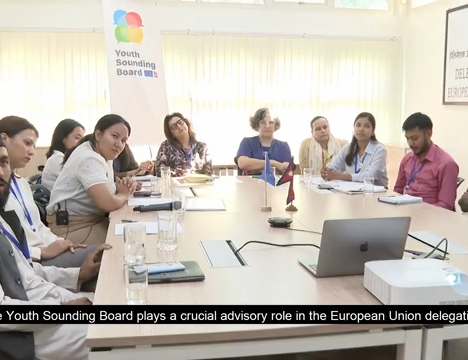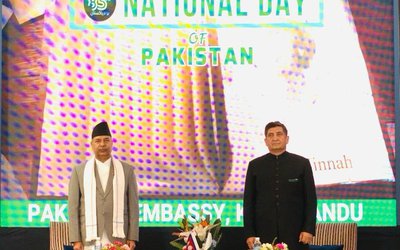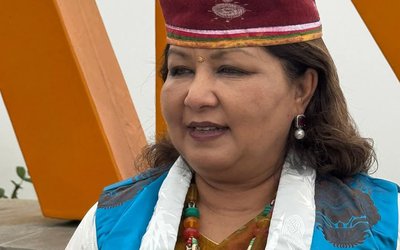
Although over half of Nepal's population is compromised of youth, the country has the lowest youth development indicator in South Asia. Due to the lack of youth-specific programs, their participation and engagement in decision-making and governance levels are negligible.

To address these challenges, the European Union stepped in to provide youth-targeted programs in Nepal. The EU started the Youth Sounding Board (YSB) globally in 2021 and launched it in Nepal in 2022.
During her visit to Nepal, Jutta Urpilainen, EU Commissioner for International Partnerships, prioritized engaging with YSB members, highlighting the EU's commitment to the youth.

Over the past year, the first cohorts of the YSB in Nepal and Ethiopia have worked closely with the European Union Delegations in various capacities. YSB members have actively participated in events, stakeholder meetings, project visits, and other activities organized by the European Union Delegations. Thanks to the initiative of the EU Delegations of Nepal and Ethiopia, the first-ever virtual Nepal-Ethiopia YSB Exchange program was successfully concluded.
During the exchange program, YSB members from Nepal and Ethiopia shared their experiences and working methodologies while engaging in insightful discussions on the critical challenges faced by youth in their respective countries.
Stefan Lock, the Head of Cooperation at the European Union Delegation to Ethiopia, emphasized the Delegation's continuous support in involving the YSB members in the EU Delegation's programs, fostering meaningful collaborations and enriching experiences for both parties.
"Many delegations of the European Union around the world are cooperating with Youth Sounding Boards. The Youth Sounding Board in each country is an advisory board comprised of young people helping to make our engagement in each partner country more relevant to the needs and ideas of youth,” said Mr. Lock.
“Young people in Ethiopia and Nepal and around the world are not only the future, they're also the present. They have the capacity to design change and to enact change, and we must listen to them and support them. We, as EU delegations, have learned a lot, and the young people have made us see new perspectives. Their voices are relevant and powerful and we hear them loud and clear.”
In his opening remarks, Dr. Marco Gemmer, Head of Cooperation at the European Union Delegation to Nepal, highlighted the activities of the YSB and the importance of the virtual exchange program.

“In the past year, the first group of Youth Sounding Board members in Nepal and Ethiopia has been involved in many activities. These have including thematic events, project activities, visits to engage with local governments, and planning meetings with the government. Despite being 5000 kilometers apart from each other, the Youth Sounding Board members from Nepal and Ethiopia have a lot to share with each other and can learn from each other,” said Dr. Gemmer.
Isaac Bezabih, a YSB member from Ethiopia, presented an overview of the youth's involvement in various activities and the objectives of the exchange.
"The main objectives of our program here is to share lessons learned from the first year Youth Sounding Board experience, to foster cross cultural collaboration and also share youth experience between Nepal and Ethiopia, beyond the scope of Youth Sounding board. So, in Ethiopia, the Youth Sounding Board plays a crucial advisory role in the European Union delegation with active thematic committees consisting of different talented youths from various regions, backgrounds, professions. The Youth Sounding Board aims to bring about real and lasting change in how the EU engages with young people in its development cooperations effort,” said Isaac.
Abhinandan Basnet, a YSB member from Nepal, provided an insightful overview of the issues and composition of the YSB in Nepal.

"The YSB consists of 25 youth members aged between 18 and 28 and they represent the three provinces of Karnali, Sudur Paschim and Madhesh in Nepal. This ensures that the board represents the unique perspective, needs and challenges of each province. Targeted provinces - these provinces were selected due to their underdeveloped nature, low social and economic quality, and limited access to resources and opportunities compared to Kathmandu. Including representatives from these provinces helps the YSB address the specific issues faced by young people in these regions,” said Basnet.
“The Youth Sounding Board (YSB) works under 3 thematic groups. The YSB comprises thematic groups that focus on specific areas of interest and concern, and reflects the projects that the implementing partners are involved in. This includes promoting women's participation in election, conducting outreach programs for climate smart entrepreneurship, engaging in GBV policy discussions and enhancing youth employability.”
During the discussion, YSB members from Nepal, including Namuna Giri, Aagya Shrestha, Neha Karki, and Sonali Singh Patel, addressed governance, gender inclusion, and climate change issues along with their implications.
Namuna Giri YSB-Nepal said, “I am going to talk about governance, peace and security in relation to YSB. Nepal, during the reign of King Birendra, from 1972 to 2001, made an indirect proposal to be declared a Zone of Peace. It has been observed that about 112 countries were in support, except for India and the then Soviet Union. Looking back and observing today, the political instability, the extreme dissatisfaction of the people in their government, and the poor representation of youth in higher change making positions arise whether Nepal could ever achieve the status of a peaceful nation or even vouch for it.”
Adonias Beyene from YSB-Ethiopia said, “the youths have a vital role to play in the governance, peace and security. It is because they are 65% of the continent, if we ignore this 65% of the population; we are not working on any development of the country. So, that’s why it is very crucial and important for the youths to play a role in governance, peace and security.”
Sonali Patel YSB-Nepal also stated her views on climate change and its impact on Nepal. Sonali said, “when it comes to climate change, many of us are still living in delusion that it is not real, that it is a hoax. But, as an environment conservation enthusiast, I’d like to emphasize that climate change is very much real. It is unequivocal that climate change is happening and the impacts of climate change can be seen throughout the world, although the impacts are not equal in all parts.”
Aemon Berhane from YSB-Ethiopia said, “Ethiopia has one of the youngest populations within Africa. 70% of our population is under the age of 30 and according to the World Bank, the youth unemployment rate is 5.72%, a 0.78%, increase from the past two years ever since COVID happened. And this is primarily with regards to low level of education within our education systems, the lack of job opportunities and the rural, urban migration. The YSB can really help in a way that we want to be able to work on policies with stakeholders, to improve the quality of education given to our young population and to be able to better invest in educational system and the quality of teaching,” said Aemon.
On the topic of youth unemployment in Nepal, Aagya Shrestha said, “The problem here is with the quality of education we have been receiving. The education system in Nepal often fails to equip young people with the skills and qualifications needed by the job market, resulting in massive youth unemployment.”
In her closing remarks Neha Karki, YSB-Nepal said, “we feel much empowered and we feel so much more ready to raise our voice – louder - and create an impact in our community and in our country. And at the same time, we are learning so many things about INGOs and the EU, and also from this inter-cultural exchange that is happening virtually at this moment – this is a great opportunity for us to connect with you and we are sure that YSB is growing globally and we all very much look forward to see what it’s going to bring.
Similarly, Bezabih from Ethiopia said,” the Youth Sounding Board in Ethiopia has successfully fostered inclusive dialogues and representation among youth throughout the country. This is one of the things that we feel is really functioning well and working very much in a visible way where we can see it working. The platform also bridges the gap between the young people and also the European Union, and also empowering youth to share policy decisions, this is something very vital and important.”
At the national level, the EU encourages YSB members to take part in youth-oriented projects funded by the EU. For example, the Promotion of Youth Engagement in Local Governance Process (PROYEL) project, implemented by Helvetas Nepal is currently in progress in eight municipalities of the Madhesh and Karnali Provinces.
Dr. Prabin Manandhar, the country director of Helevetas Nepal, believes that engaging youth in local governance and decision-making is essential.
Aagya Pokharel, Program Coordinator of PROYEL, commented, "Helvetas Nepal has been providing support to YSB board members to engage in local-level governance, climate initiatives, youth entrepreneurship, and employment-generating sectors into the PROYEL Project Areas.
Pokharel added, “Helvetas -Nepal has been fostering collaboration between our Youth Panel Members and YSB under PROYEL. Youth Panel Members interact with local level governments and YSB, the central level decision-making body.”
This exchange was a groundbreaking initiative, marking the first step towards building a global youth community and forming connections among YSBs. It enabled the sharing of experiences and mutual learning, allowing them to strengthen their engagements with the EU Delegations. The YSB hopes to bring about real and lasting changes in how the EU engages with young people in its development cooperation efforts. Catch all the details of the exchange here:

Keshab Poudel
Poudel is the editor of New Spotlight Magazine.
- KUL MAN GHISING: Bowing Down To The People
- Apr 13, 2025
- POLITICAL VIOLENCE: Culture of Impunity
- Apr 11, 2025
- PM OLI MEETS PM MODI: No Progress
- Apr 09, 2025
- PM OLI’S THAILAND VISIT: Flip Flop
- Apr 08, 2025
- FM Dr. Deuba’s India Visit: Mission Aborted
- Mar 26, 2025














